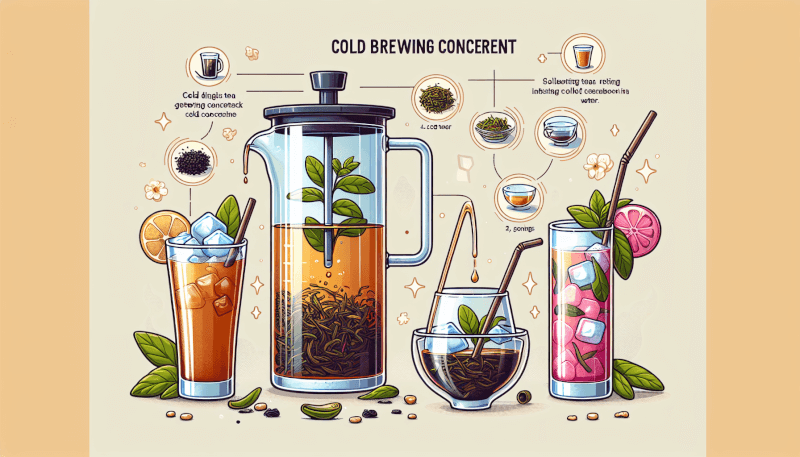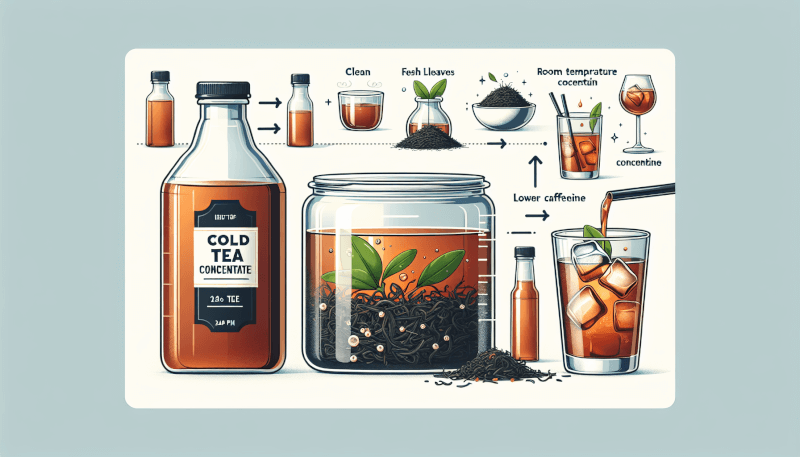Have you ever wondered how to make the perfect cup of cold brewed tea concentrate? Look no further, because we are about to reveal the secrets behind this delightful beverage. Cold brewing tea concentrate is not only a refreshing way to enjoy your favorite tea, but it also brings out unique flavors and aromas that are often overlooked with other brewing methods. In this article, we will guide you through the art of cold brewing tea concentrate, from selecting the right tea leaves to steeping techniques that will leave you with a concentrated infusion of pure tea goodness. Get ready to embark on a journey of taste and discover a whole new world of tea enjoyment.

Choosing the Right Tea
When it comes to cold brewing tea, selecting the right tea is crucial in achieving the perfect flavor and aroma. There are various types of tea available, each with its unique characteristics and brewing requirements. Understanding the different types of tea will help you make an informed decision and create a delightful cold brew experience.
Understanding the Different Types of Tea
Tea can be broadly categorized into several types, including black tea, green tea, white tea, oolong tea, herbal tea, and fruit tea. Each type has its distinct flavor profile and brewing technique.
Black tea, known for its bold and robust flavor, is a popular choice for cold brewing. It provides a rich and satisfying taste that pairs well with various fruits and herbs. Green tea, on the other hand, has a lighter and more delicate flavor. It offers a refreshing and smooth taste, making it a great option for those looking for a lighter cold brew experience.
White tea, with its subtle and nuanced flavor, is another fantastic choice for cold brewing. It has a delicate sweetness and floral notes that create a gentle and soothing cold brew. Oolong tea, with its partially oxidized leaves, strikes a balance between the rich flavor of black tea and the fresh taste of green tea. It offers a unique and complex flavor profile that is sure to excite your taste buds.
Herbal tea and fruit tea, while not technically tea from the Camellia Sinensis plant, are popular choices for cold brewing. Herbal teas, such as chamomile or peppermint, provide a soothing and calming cold brew experience. Fruit teas, on the other hand, offer a burst of fruity flavors and vibrant colors, making them a delightful choice for refreshing iced teas.
Selecting the Tea for Cold Brewing
Once you have a clear understanding of the different types of tea, it’s time to select the perfect tea for cold brewing. Consider the flavor profile you are looking for and the ingredients you plan to pair it with. If you prefer a stronger and bolder flavor, black tea might be your best bet. If you enjoy a lighter and more refreshing taste, green or white tea may be your go-to options.
Moreover, consider the quality of the tea leaves. Opt for loose-leaf teas whenever possible, as they provide a better flavor and quality compared to tea bags. Loose-leaf teas allow the leaves to expand fully during the brewing process, resulting in a more flavorful and aromatic cold brew.
Remember, experimentation is key when it comes to selecting the right tea for cold brewing. Don’t be afraid to try different combinations and variations to find the perfect tea that suits your taste preferences.
Essential Equipment
To embark on your cold brewing journey, it’s important to have the right equipment to ensure a smooth and enjoyable brewing experience. Here are the essential tools you’ll need:
Glass or Plastic Pitcher
A glass or plastic pitcher is an ideal container for cold brewing tea. Opt for one that is heat-resistant and large enough to accommodate the amount of tea concentrate you plan to make. Glass pitchers are great as they allow you to appreciate the beautiful colors of the tea, while plastic pitchers are lightweight and easily portable.
When selecting a pitcher, ensure that it has a tight-fitting lid to prevent any contamination or spills during the brewing process. This will help maintain the freshness and integrity of your tea concentrate.
Tea Infuser or Filter
To avoid any loose tea leaves floating in your concentrate, a tea infuser or filter is essential. These tools allow you to steep the tea leaves without worrying about any residue in your brew. Choose a tea infuser or filter that fits well in your pitcher and is easy to clean afterward.
There are various types of tea infusers available, such as mesh infusers or tea balls, that can be filled with loose tea leaves. Alternatively, you can use disposable tea bags or tea sachets for a convenient brewing experience.
Water
Water is the most critical component of cold brewing tea. It’s important to use high-quality water to ensure the best possible flavors and avoid any unwanted impurities. While tap water can be used, using filtered water is recommended to remove any chlorine or other chemicals that may affect the taste of the tea concentrate.
Water Selection and Temperature
The quality of water and the temperature at which you brew your tea are two vital factors that can significantly impact the flavor and quality of your cold brew concentrate. Let’s delve into these aspects and explore how to make the most of your brewing process.
Importance of Using Filtered Water
Using filtered water is crucial when it comes to cold brewing tea. Tap water often contains chlorine and other chemicals that can adversely affect the flavor of your tea concentrate. By filtering your water, you remove these impurities and create a clean canvas for the flavors of the tea to shine through.
Investing in a water filter or using a filter jug can greatly enhance your cold brewing experience. Not only will it improve the taste of your tea concentrate, but it will also ensure that you create a healthier and more enjoyable beverage.
Finding the Optimal Water Temperature
Unlike traditional hot brewing methods, cold brewing requires a longer steeping time due to the lower water temperature. It’s important to find the optimal water temperature to extract the desired flavors without bringing out any bitter or astringent notes.
The ideal water temperature for cold brewing typically ranges between 40°F (4°C) and 60°F (15°C). However, this can vary depending on the type of tea you are brewing. For example, delicate teas such as green or white tea require a lower temperature, while black teas can handle slightly higher temperatures.
To achieve the optimal water temperature, you can either refrigerate your filtered water for a few hours or add ice cubes to cool it down. Keep in mind that the brewing time will also influence the strength and flavor of your tea concentrate, so be prepared for some experimenting to discover your perfect brew.
Tea-to-Water Ratio
Achieving the ideal tea-to-water ratio is crucial to strike the right balance of flavors in your cold brew concentrate. The ratio will largely depend on your personal taste preferences, the type of tea you are using, and the desired strength of the concentrate.
Determining the Ideal Ratio
As a general guideline, a common tea-to-water ratio for cold brewing is 1:4. This means one part of tea leaves to four parts of water. However, feel free to adjust this ratio based on your taste preferences. If you prefer a stronger and bolder concentrate, you can increase the amount of tea leaves, and if you prefer a milder brew, you can decrease the tea-to-water ratio.
Experimentation is key when determining the ideal ratio. Start with the recommended ratio and adjust it according to your taste as you gain more experience. Be prepared to discover your own perfect ratio that brings out the flavors you enjoy most.
Adjusting the Strength of the Concentrate
If you find that your cold brew concentrate is too strong or too weak, there are a few ways to adjust the strength to your liking. If the concentrate is too strong, you can dilute it with additional filtered water until it reaches your desired taste. On the other hand, if the concentrate is too weak, you can increase the amount of tea leaves in your next batch or reduce the amount of water used.
These adjustments allow you to customize the strength of your cold brew concentrate and create a beverage that perfectly suits your taste buds. Remember, it’s all about finding the right balance that brings out the flavors you love most.

Brewing Time
The brewing time plays a crucial role in infusing the flavors of the tea leaves into the water. While the longer the steeping time, the stronger the concentrate, it’s important to understand the impact of different brewing times to achieve your desired taste profile.
The Role of Steeping Time
Unlike hot brewing methods that typically require a few minutes, cold brewing tea takes considerably longer. The slow extraction process allows for a smoother and more balanced flavor profile. The general rule of thumb for cold brewing is to steep the tea leaves for at least 8 to 12 hours. However, this can vary depending on the type of tea leaves and personal preferences.
Keep in mind that steeping the tea leaves for too long can result in a bitter or astringent taste. It’s important to find the right balance by experimenting with different steeping times to achieve the flavors you enjoy most.
Experimenting with Different Brew Times
Cold brewing offers the opportunity for experimentation and creativity. You can try different brew times to extract various flavors and intensities. For example, a shorter steeping time of 4 to 6 hours may result in a milder and more delicate flavor, while an extended steeping time of 12 to 24 hours may produce a stronger and bolder concentrate.
Don’t be afraid to explore different brew times and discover the flavors that excite your taste buds. Keep notes of your experiments to replicate the ones you love in the future.
Cold Brewing Techniques
There are various techniques you can employ to cold brew your tea concentrate. Let’s explore two popular methods that yield excellent results.
Slow-Drip Method
The slow-drip method, also known as the Japanese method, involves using a special cold brew tower and relying on the force of gravity to slowly and continuously drip water over the tea leaves. This method allows for a precise control of the brewing process and results in a clean and crisp cold brew concentrate.
To use this method, assemble the tower according to the manufacturer’s instructions and add the desired amount of tea leaves to the brewing chamber. Slowly pour filtered water into the top chamber and adjust the dripping rate to achieve the desired strength. Allow the water to gradually drip over the tea leaves for the recommended brewing time.
The slow-drip method requires patience and time but rewards you with a beautifully crafted tea concentrate. It’s a great option for tea enthusiasts who appreciate the art and precision of cold brewing.
Overnight Method
The overnight method is the most straightforward and convenient technique for cold brewing tea concentrate. It involves steeping the tea leaves in a pitcher of cool water and allowing it to infuse overnight in the refrigerator.
To use this method, simply add the desired amount of tea leaves to your pitcher, pour filtered water over the leaves, and cover the pitcher tightly. Place the pitcher in the refrigerator and let it steep for at least 8 to 12 hours. In the morning, remove the tea leaves, and your cold brew concentrate is ready to be enjoyed.
The overnight method is perfect for those who prefer a hands-off approach to tea brewing. It requires minimal effort and creates a smooth and refreshing concentrate that is perfect for those hot summer days.

Flavor Enhancements
Cold brewing tea not only offers a refreshing beverage on its own, but it also provides a canvas for endless flavor combinations and enhancements. Let’s explore ways to take your cold brew concentrate to the next level.
Adding Fruits and Herbs
One of the most popular ways to enhance the flavor of cold brew tea is by adding fruits and herbs. Fruits such as citrus slices, berries, or melon chunks add a burst of freshness and natural sweetness to your concentrate. Herbs like mint, basil, or lavender can infuse your tea with delightful aromas and unique flavor profiles.
To add fruits or herbs, simply place them in the pitcher along with the tea leaves before steeping. Allow the flavors to meld together during the cold brewing process. Experiment with different combinations to find the perfect flavor pairing that suits your taste preferences.
Experimenting with Sweeteners
If you prefer a sweeter cold brew concentrate, there are several sweeteners you can explore. Natural sweeteners like honey or agave syrup add a touch of sweetness without overpowering the flavors of the tea. Alternatively, you can use simple syrup or flavored syrups to create more complex and decadent cold brew beverages.
When sweetening your cold brew concentrate, start with a small amount and adjust to taste. Remember, it’s always easier to add more sweetener, but difficult to remove excessive sweetness. Be mindful of the flavors of your tea and use sweeteners that complement rather than overpower them.
Storing and Preserving Concentrate
To ensure that your cold brew concentrate remains fresh and flavorful for an extended period, proper storage is essential. Let’s dive into the best practices for storing and preserving your precious tea concentrate.
Proper Storage Containers
When it comes to storing cold brew concentrate, opt for airtight containers that can be sealed tightly to prevent any air or moisture from reaching the concentrate. Glass bottles or jars with screw-top lids are excellent choices as they do not retain any residual flavors or odors.
Avoid using containers made of materials that could potentially react with the tea concentrate, such as plastic, as they may alter the taste and quality of the concentrate over time. Additionally, choose containers that are the appropriate size for your desired serving portions to minimize any unnecessary exposure to air.
Freezing and Thawing Techniques
If you have made a large batch of cold brew concentrate and wish to prolong its shelf life, freezing is an effective method. Pour the concentrate into ice cube trays or freezer-safe containers, leaving some headspace to allow for expansion during freezing. Ensure that the containers are airtight to prevent any freezer burn or absorption of odors.
When you’re ready to enjoy your frozen cold brew, simply thaw the concentrate in the refrigerator overnight or at room temperature for a few hours. Remember to shake or stir the concentrate before using to ensure that any settled sediment is evenly distributed. Frozen cold brew concentrate can last up to three months without sacrificing its flavor and quality.

Serving and Enjoyment
Now that your cold brew concentrate is prepared, it’s time to start serving and enjoying the fruits of your labor. Here are a few tips to enhance your serving experience.
Diluting the Concentrate
Cold brew concentrate is usually stronger than traditional hot brewed tea, so diluting it with water or ice is recommended. Start by adding an equal amount of cold water or ice to the concentrate and adjust according to your taste preferences. Some individuals prefer a stronger concentrate and may choose not to dilute it at all. It’s all about finding the right balance that allows you to fully enjoy the flavors and strengths of your cold brew.
Serving Ideas and Garnishes
Let your creativity shine by exploring different serving ideas and garnishes to elevate your cold brew experience. You can serve your cold brew over ice with a slice of lemon or lime for a refreshing twist. Alternatively, you can create cold brew mocktails by mixing the concentrate with sparkling water or herbal infusions.
If you’re feeling adventurous, try incorporating your cold brew concentrate into culinary creations such as smoothies, cocktails, or desserts. The possibilities are endless, so don’t be afraid to experiment and have fun with your cold brew.
Health Benefits and Considerations
Cold brewing tea offers not only a delightful beverage but also several health benefits. Understanding the advantages and considerations associated with cold brewed tea can help you make informed choices and enjoy your favorite drink to the fullest.
Antioxidant Properties of Cold Brewed Tea
Like hot brewed tea, cold brewed tea is rich in antioxidants, which are beneficial compounds that help protect the body against damage caused by harmful free radicals. Antioxidants are known to have anti-inflammatory and anti-aging properties, promoting overall health and well-being.
The cold brewing process allows for a more gradual extraction of antioxidants, resulting in a potentially higher concentration compared to hot brewing methods. This makes cold brewed tea an excellent choice for individuals seeking to maximize their antioxidant intake.
Caffeine Content and Sensitivity
It’s important to note that cold brewed tea generally has a lower caffeine content compared to hot brewed tea. The longer infusion time and lower water temperature result in a milder caffeine release. This makes cold brewed tea a great option for those who are more sensitive to caffeine or prefer to reduce their overall caffeine consumption.
However, it’s worth mentioning that caffeine content can vary depending on the type of tea used. For example, black tea generally contains more caffeine than green or white tea. If you are particularly sensitive to caffeine, consider opting for caffeine-reduced or herbal teas for your cold brewing adventures.
In conclusion, cold brewing tea is an art that offers a refreshing and flavorful experience. By understanding the different types of tea, selecting the right equipment, and experimenting with brewing techniques, you can create your own perfect tea concentrate. Enhance your cold brew with fruits, herbs, and sweeteners to suit your taste preferences, and store it properly for long-lasting enjoyment. With the benefits of antioxidants and the flexibility to adapt to caffeine preferences, cold brewed tea is a delightful and health-conscious choice for tea enthusiasts. So, go ahead, embark on your cold brewing journey, and let the flavors of your favorite tea infuse into a delicious and satisfying beverage. Cheers to the art of cold brewing tea concentrate!



